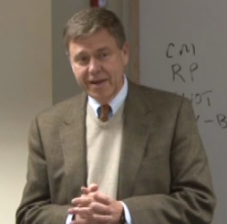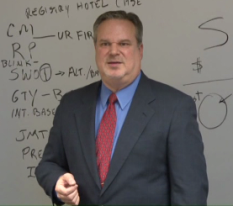College Site | Development | TOC - Department Dev Sites | CLHS TOC | Center for Law, Health & Society | News and Events | Center News | Speakers Discuss New Models of Negotiation Practice Speakers Discuss New Models of Negotiation Practice
March 18, 2011
ATLANTA - Many law students come to Professor Charity Scott's class on Negotiation with a highly competitive mindset: "Teach me how to win a negotiation." Scott aims to shift this mindset to a more collaborative, problem-solving approach where negotiations are seen as opportunities for both sides to resolve a dispute or do a deal in a way where everyone feels that they have "won."
 "The competitive, 'win-lose' mindset of law students is a natural, even inevitable, result of what and how we teach them in law school," said Scott. "We teach them the law during their first year almost entirely through appellate court decisions, where by definition one side wins and the other loses. Our required upper-level curriculum focuses on litigation and courtroom evidence rules. Many students get few opportunities before they graduate to consider alternative ways of solving clients' problems other than through litigation."
"The competitive, 'win-lose' mindset of law students is a natural, even inevitable, result of what and how we teach them in law school," said Scott. "We teach them the law during their first year almost entirely through appellate court decisions, where by definition one side wins and the other loses. Our required upper-level curriculum focuses on litigation and courtroom evidence rules. Many students get few opportunities before they graduate to consider alternative ways of solving clients' problems other than through litigation."
"If the only tool we give them is a hammer," Scott concluded, "it should come as no surprise that they view every problem as a nail."
For the past two years, Scott has invited two highly respected practicing attorneys to help counter this win-lose mindset by discussing their real-world perspectives on good negotiation practices. Each speaker has developed an alternative model to the typical adversarial, hard-bargaining approach of many lawyers to the negotiation and settlement of claims.
Jim Golden, a former litigator, currently practices as Negotiation Counsel for the law firm Scopelitis, Garvin, Light, Hanson & Feary in Chattanooga, Tennessee. The firm handles serious trucking accidents and other transportation industry disputes. According to the firm's Web site, the benefits of the Negotiation Counsel model that Golden has developed include: quicker resolutions of claims; more humane treatment of people in involved in serious accidents; customized win-win settlement packages; and savings in time and costs through lower attorney fees and fewer litigation-oriented expenditures. See http://www.scopelitis.com/attorneys/bio.cfm?id=64.
This year Golden's daughter, Stephanie, joined him in speaking with the law students. She discussed the risks that her father took in changing his approach to legal practice (and to life) over the years, and the importance of personal identity in shaping professional practice. "I'll never know what to do until I know who I am," said Golden, summarizing how he thinks about his personal and professional lives.
 Dale Hetzler, formerly general counsel with Children's Healthcare of Atlanta, is now Senior Vice President and Chief Legal Officer for Erlanger Health System in Chattanooga, Tennessee. He has a master's in conflict management from Kennesaw State University. Alternative approaches pervade his handling of medical malpractice claims and other legal issues that can arise in hospital settings. He emphasizes the role of good communication both before and after an adverse event occurs: being transparent about what happened with the patient and family, and focusing from the outset on resolution through collaboration and mediation.
Dale Hetzler, formerly general counsel with Children's Healthcare of Atlanta, is now Senior Vice President and Chief Legal Officer for Erlanger Health System in Chattanooga, Tennessee. He has a master's in conflict management from Kennesaw State University. Alternative approaches pervade his handling of medical malpractice claims and other legal issues that can arise in hospital settings. He emphasizes the role of good communication both before and after an adverse event occurs: being transparent about what happened with the patient and family, and focusing from the outset on resolution through collaboration and mediation.
"It will be important for healthcare enterprises to anticipate that communication skills and conflict skills will become primary predictors of the organization's ability to progress in both quality improvement and patient safety," Hetzler said in a draft paper he is working on for the American Health Lawyers Association. "For those who adopt this approach, they can expect lower turn-over, less burnout, increased patient loyalty, and lower rates of medical error."
The video for Jim Golden's talk is at http://hollywood.gsu.edu/law/clhs/Jim_Golden.mov
The video for Dale Hetzler's talk is at http://hollywood.gsu.edu/law/clhs/Dale_Hetzler.mov